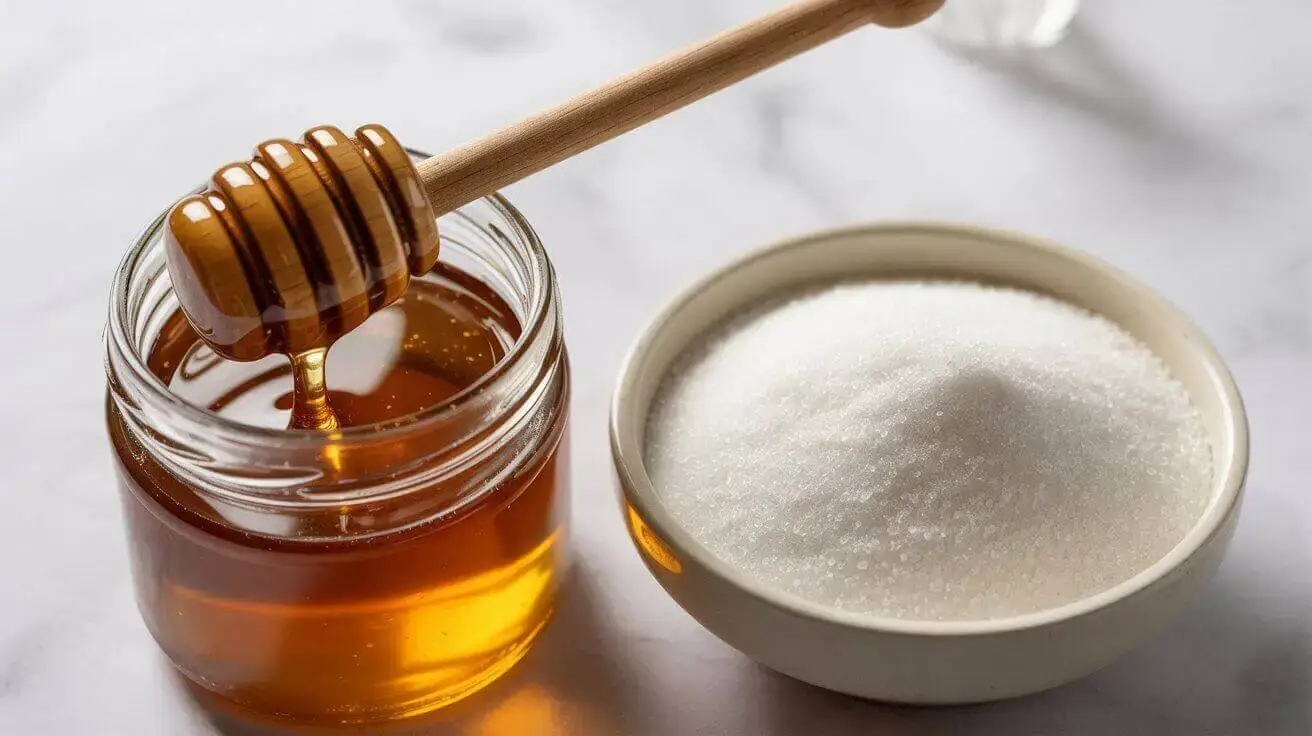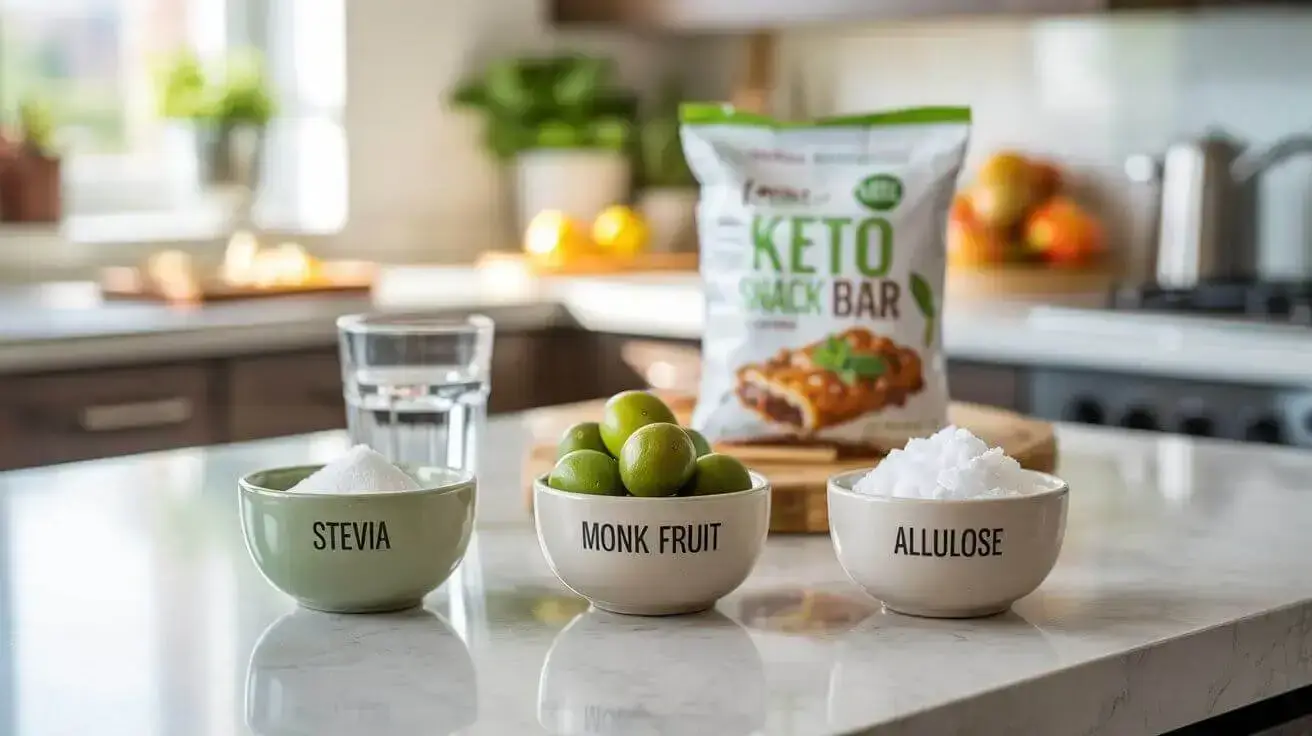For many households, the sweetener choice seems simple—yet the question continues to circulate: is honey healthier than sugar? Both offer sweetness, but the way the body responds to honey vs sugar can differ in subtle ways. With so many mixed messages online, understanding these differences helps you make choices aligned with your health goals, without giving up the flavors you enjoy.
Why the Honey vs Sugar Debate Matters
Sweeteners show up everywhere—cereals, sauces, bread, snacks, beverages, and hundreds of packaged foods. On average, Americans consume far more added sugars than recommended, pushing many families to look for “healthier” alternatives.
Because honey feels natural and less processed, people often assume it must be the better option. But the truth is more nuanced: both honey and sugar can fit into balanced eating when used mindfully.
More Helpful Reads You Might Like:
What Happens in Your Body
Although honey and sugar look quite different, their core structure is similar. Both primarily contain glucose and fructose, two simple carbohydrates your body breaks down for energy.
How the Body Processes Honey
Honey contains a mixture of natural sugars, trace vitamins and minerals, enzymes, and plant-based antioxidant compounds. It’s also slightly sweeter than sugar, so many people find they use less of it.
Honey’s unique plant compounds and pollen traces may influence digestion and absorption. Many varieties—especially darker honeys—have a lower glycemic index (GI) than table sugar, meaning they may cause a gentler rise in blood glucose for some individuals. However, this varies depending on the type of honey and individual metabolism.
How the Body Processes Sugar
Table sugar, or sucrose, is made of equal parts glucose and fructose. It is quickly absorbed, often causing rapid blood sugar spikes when eaten in large amounts. Sugar is inexpensive, stable, and neutral in flavor, which is why it appears in so many processed foods.
Unlike honey, sugar contains no antioxidants or additional nutrients, but it is predictable and easy to use in recipes.
Is Honey Healthier Than Sugar? What Research Shows
The answer depends on what “healthier” means in everyday life.
Calories and Glycemic Impact
- 1 tablespoon of sugar: ~49 calories
- 1 tablespoon of honey: ~64 calories
Even though honey has more calories per serving, its sweetness intensity may help reduce overall intake.
Honey generally has a slightly lower glycemic impact than sugar, meaning it may cause a slower rise in blood glucose. Still, this difference is usually not enough to significantly impact blood sugar management for people with metabolic conditions.
Antioxidants and Plant Compounds
Honey contains antioxidants—especially flavonoids and phenolic acids—which help support the body’s natural defenses against cellular stress. Darker honeys, like buckwheat honey, typically contain higher antioxidant levels.
Sugar contains zero antioxidants, giving honey a small but meaningful nutritional advantage.
Blood Sugar, Weight, and Metabolism
Some studies suggest honey may affect blood sugar differently from table sugar, but honey is still categorized as an added sugar in dietary guidelines. Excessive consumption of either sweetener can contribute to weight gain or higher blood sugar levels.
Honey may offer subtle benefits, but it is not a “free pass” to unlimited sweetening.
When Honey May Be a Better Choice
For Soothing Sore Throats and Coughs
Honey has long been used as a natural remedy. The American Academy of Pediatrics notes that honey may help reduce nighttime coughing in children over 1 year old due to its smooth, coating effect.
When Trying to Reduce Added Sugar Intake
Honey’s richer flavor means a small drizzle can be satisfying. For many people, this naturally reduces total sweetener consumption over time.
When Honey Is Not the Better Option
Safety for Infants
Honey should never be given to children under 12 months due to the risk of infant botulism.
Blood Sugar or Metabolic Concerns
People managing diabetes or prediabetes should consult a clinician before substituting honey for sugar. While honey may have a lower GI, it still raises blood glucose and contains more calories per tablespoon.
Practical Tips for Using Honey and Sugar Wisely
Dietary patterns matter more than any single sweetener. Small, sustainable choices often make the biggest difference.
How to Reduce Added Sugars
Try:
- Using less sweetener in tea or coffee
- Choosing plain yogurt and adding fresh fruit
- Checking labels for hidden sugars
- Cooking more meals at home
- Treating sweetened beverages as occasional choices
Natural Substitutions That Feel Easy
- Mashed ripe bananas in baked goods
- Applesauce as a partial sugar substitute
- Roasted vegetables that develop natural sweetness
- Spices like cinnamon, nutmeg, or vanilla to enhance flavor
These shifts can reduce dependence on added sugars without sacrificing enjoyment.
Bottom Line: Honey vs Sugar
Honey does offer a few advantages—antioxidants, richer flavor, and possibly a slightly gentler glycemic effect. But it is still an added sugar and should be used in moderation just like table sugar.
Rather than focusing on choosing one sweetener over the other, the healthiest approach is finding balanced, sustainable habits that support your overall diet and lifestyle.
FAQs
Is honey really healthier than sugar?
Honey contains antioxidants and may have a slightly lower glycemic impact than sugar, but both are still classified as added sugars and should be consumed in moderation.
Does honey raise blood sugar?
Yes. Honey still raises blood glucose levels, though the rise may be slower than with table sugar for some individuals.
Is raw honey healthier than regular honey?
Raw honey often contains more enzymes and antioxidant compounds because it undergoes less processing.
Is honey safe for people with diabetes?
Honey can affect blood sugar and should only be used with clinical guidance. Portion control remains essential.
Why does honey have more calories than sugar?
Honey is denser and contains water, plant compounds, and natural sugars. This leads to a higher calorie count per tablespoon.
Which honey has the lowest glycemic index?
Darker honeys, such as buckwheat honey, generally have lower GIs and higher antioxidant levels.
Medical Disclaimer: This content is for educational purposes only and does not replace professional medical advice, diagnosis, or treatment. Always consult your physician or a qualified healthcare provider with any questions about a medical condition.










